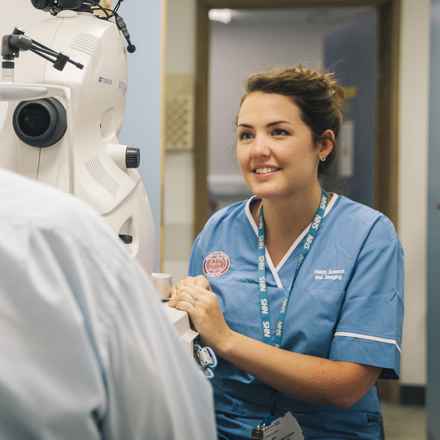First national guidance on diabetic eye disease published
Posted: Wednesday 04 September 2024
The National Institute for Health and Care Excellence (NICE) has published the first national guidelines for diagnosing and monitoring diabetic retinopathy in patients under the care of hospital eye services.
The guidelines, which mark a significant step forward in the management of diabetic retinopathy, aim to standardise care and improve outcomes for patients across England and Wales.
What is diabetic retinopathy?
Diabetic retinopathy is a serious complication of diabetes that occurs when high blood sugar levels damage the retina, the light-sensitive tissue at the back of the eye. If left undiagnosed and untreated, it can lead to sight loss.
Despite the severity of the condition, early detection and treatment can significantly reduce the risk of vision loss.
The guidelines
The new NICE guidelines offer advice on managing and monitoring diabetic eye disease for patients in hospital care. They focus on managing diabetes to protect eye health, handling cataract surgery, and treating different types of diabetic retinopathy. These guidelines do not cover routine annual eye checks, which are handled by the NHS screening programme.
The guidelines also highlight the need for regular eye checks and helps patients understand how managing their blood sugar, blood pressure, and cholesterol can protect their vision. They put patients first, encouraging healthcare teams to adjust treatments based on each person’s needs and personal situations, such as work, caregiving, and disabilities.
More research is essential
Berni Warren, who has diabetic retinopathy and maculopathy, was a member of the guideline committee.
She said: "As someone living with diabetic retinopathy and maculopathy, the publication of the new NICE guidelines is welcome.
"It is an extensive document covering diabetic eye diseases as well as guidance in cataract surgery while living with diabetic retinopathy which has been worrying for me and for others."
Berni who lost her sight after rapidly reducing her blood sugar levels, added: "I am particularly pleased that it recognises the importance of the link between a rapid reduction in HbA1c (blood sugar) and the possible impact on eye health, having lost my sight due to this very factor.
"The recommendation for more research within this guidance is even more essential."
Ensuring best care for patients
Sarah Brown, director of NICE’s Centre for Guidelines, said: “These guidelines represent a critical development in the management of diabetic retinopathy, providing healthcare professionals with clear recommendations to ensure that all patients receive the best possible care to protect their sight.”
Support for you
We provide free information and support to those with macular disease, along with their family and friends, to help people keep their independence.
Get involved in research
Patients have a very important part to play in medical research. Without them we would not have the treatments we have today and new and improved treatments would not be possible.




